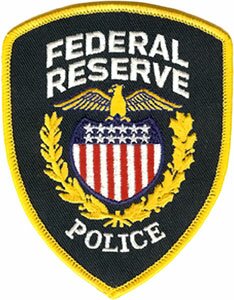Disturbing New Powers Granted to Federal Reserve Police Officers
September 18th, 2012In 1913, the Congress voted to delegate its authority over the issuance of currency to a private bank with unknown shareholders. The Federal Reserve system was created, granting extraordinary power over the US and world economy to a small number of people who appear to have used this advantage to secure personal gain while incrementally crippling the value of the dollar.
Few realize that the Federal Reserve has its own branch of law enforcement, which has also been incrementally gaining power over time. In today’s legal environment where the government interprets its authority to include detaining citizens indefinitely without a trial, granting law enforcement authority to a private organization with unknown motives and no accountability is a recipe for disaster.
Federal Reserve Police: Not Just for On-Site Security Anymore
For some legally questionable reason, the original architects of the Federal Reserve Act included language to allow for the appointment (by the private bank itself) of special police officers to conduct security on the campus of each Federal Reserve Bank. Private property owners are already allowed to hire private security to protect their property. Since private security guards in some ways have more power to deal with on-site threats than police officers, this policy was unnecessary.
88 years later, former President Bush escalated the situation by signing the PATRIOT Act into law. In the emotional moments after 911, the public clamored for new legislation to prevent future attacks. Rather than addressing the bureaucratic failures caused by having too many law enforcement and intelligence services with overlapping purposes, lawmakers took the opportunity to dismantle civil liberties, create more law enforcement agencies with lower hiring standards, and transfer authorities vested in either the Congress, the states, or the people to the executive branch and/or select private organizations. When it comes to authoritarian policies, the PATRIOT Act included everything but the kitchen sink, and one of the provisions granted alarming new authority to the Federal Reserve Police.
A recent article on AlterNet noted this disturbing expansion of authority, found in section 364 of the PATRIOT Act. The language authorizes Federal Reserve Police “to carry firearms and make arrests without warrants for any offense against the United States committed in their presence.” Additionally, it grants them the ability to “have access to law enforcement information.” After the passage of the PATRIOT Act, the federal, state, and local law enforcement community have an alarming amount of information about private individuals. NSA whistle-blowers have indicated that this may include private emails, text messages, and other unconstitutionally-attained data on law-abiding citizens. Is this the type of data that a private bank with unknown shareholders should have access to?
Federal Reserve Police: Armed and Dangerous
The right of the Federal Reserve to have armed security is unquestionable. This would be true even if it were a private bank with no special authority. Banks are known targets for organized and armed criminal activity. However, this authority to carry weapons, arrest people, and even use deadly force now extends far beyond the property line at local Federal Reserve branches.
In 2010, President Barack Obama added some grease to the slippery slope by passing the Law Enforcement Officers’ Safety Act Improvements Act (the double usage of “act” is not a typo, but the actual name of the bill). This law finally turned all Federal Reserve Law Enforcement Officers into full-blown federal police, on and off campus.
The Federal Reserve Police have their own training academy where they learn to use semi-automatic handguns, assault rifles, sub-machine guns, and all the other more advanced militarized goodies normally used by police officers in this day and age. Plain-clothed, undercover officers are empowered to act as personal security to special dignitaries, the Federal Reserve’s Governors and other executives, and possibly even its shareholders.
Since these officers have law enforcement power in any location in which they are standing, this means these plain-clothed officers have roving police powers which extend to anywhere Federal Reserve VIPs might choose to go. Since the FBI has been detaining and questioning citizens recently for Constitutionally-protected speech, could Federal Reserve officers launch terrorism investigations in the future against activists who are working to repeal its charter?
The implications are terrifying.
Armed with an array of weapons including 40 caliber Glock 22s, Federal Reserve Police have all the same powers as traditional federal agents. While all citizens have a Constitutionally-protected right to bear arms, it’s alarming that they could conceivably unleash deadly force in virtually any location for dubious reasons, as they have police power both on and off duty. Law enforcement officers rarely face criminal proceedings after using deadly force on someone innocent for dubious reasons, instead being “punished” with paid administrative leave in many cases (see also: paid vacation).
The Silver Circle Movie takes place in 2019, in a future when the Federal Reserve is given unprecedented authoritative power over the US economy in response to a financial crisis. With this real-life expansion of the Federal Reserve’s unlawful law enforcement authority, events in daily life are edging disturbingly closer to the tyrannical environment found in the upcoming 3D animated film.


